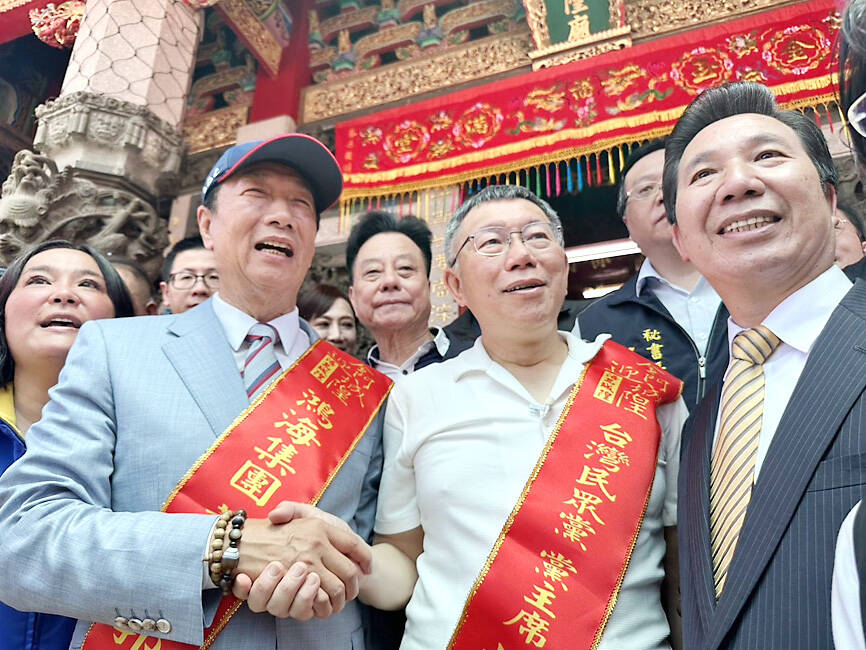Sunday’s meeting between independent presidential candidate Terry Gou (郭台銘) and Taiwan People’s Party (TPP) nominee Ko Wen-je (柯文哲) shows that anything — including a potential joint ticket between the two — is possible before Friday’s candidate filing deadline, Gou’s campaign said yesterday.
Huang Shih-hsiu (黃士修), a spokesman for Gou’s campaign, made the comments to reporters about the hour-long meeting at Gou’s home on Sunday night, one day after Ko’s negotiations on forming a joint ticket with the Chinese Nationalist Party (KMT) hit a wall due to disputes over polling results.
Huang said that KMT Chairman Eric Chu’s (朱立倫) dealings with Ko mirrored the “promise-breaking and breach of trust” Chu showed when Gou unsuccessfully sought the party’s presidential nomination in May.

Photo: Wu Cheng-Ting, Taipei Times
Given those actions, “the KMT might be on its own” in January’s election, Huang said.
Hon Hai Precision Industry Co (鴻海精密) founder Gou is preparing to register as an independent candidate, even as talks with Ko continue, and “any result is possible,” he said.
Regarding the possibility of a Gou-Ko ticket, Huang said that Gou did not have “any preset opinions” on the matter, and that Gou or Ko could lead a joint ticket.
At a rally on Sunday, Ko sent mixed signals on whether he would continue seeking an alliance with the KMT, saying he would “extend utmost goodwill” to unite opposition parties, but is committed to “fight to the end” as the TPP’s presidential candidate.
Regarding the meeting with Gou, a Ko campaign spokesperson was similarly vague, saying that the two had discussed ways to bring opposition candidates together.
The KMT, which has nominated New Taipei Mayor Hou You-yi (侯友宜) as its presidential candidate, has set tomorrow as its deadline for forming a joint ticket with Ko.
If that fails, both the KMT and TPP would have to quickly announce their running mates to register before the end of the week.
The candidates face Vice President William Lai (賴清德), the Democratic Progressive Party’s presidential candidate, who has consistently led the field in opinion polls.
Lai yesterday announced Hsiao Bi-khim (蕭美琴), who recently resigned as representative to the US, as his running mate.

NATIONAL SECURITY THREAT: An official said that Guan Guan’s comments had gone beyond the threshold of free speech, as she advocated for the destruction of the ROC China-born media influencer Guan Guan’s (關關) residency permit has been revoked for repeatedly posting pro-China content that threatens national security, the National Immigration Agency said yesterday. Guan Guan has said many controversial things in her videos posted to Douyin (抖音), including “the red flag will soon be painted all over Taiwan” and “Taiwan is an inseparable part of China,” while expressing hope for expedited “reunification.” The agency received multiple reports alleging that Guan Guan had advocated for armed reunification last year. After investigating, the agency last month issued a notice requiring her to appear and account for her actions. Guan Guan appeared as required,

Japan and the Philippines yesterday signed a defense pact that would allow the tax-free provision of ammunition, fuel, food and other necessities when their forces stage joint training to boost deterrence against China’s growing aggression in the region and to bolster their preparation for natural disasters. Japan has faced increasing political, trade and security tensions with China, which was angered by Japanese Prime Minister Sanae Takaichi’s remark that a Chinese attack on Taiwan would be a survival-threatening situation for Japan, triggering a military response. Japan and the Philippines have also had separate territorial conflicts with Beijing in the East and South China

A strong cold air mass is expected to arrive tonight, bringing a change in weather and a drop in temperature, the Central Weather Administration (CWA) said. The coldest time would be early on Thursday morning, with temperatures in some areas dipping as low as 8°C, it said. Daytime highs yesterday were 22°C to 24°C in northern and eastern Taiwan, and about 25°C to 28°C in the central and southern regions, it said. However, nighttime lows would dip to about 15°C to 16°C in central and northern Taiwan as well as the northeast, and 17°C to 19°C elsewhere, it said. Tropical Storm Nokaen, currently

PAPERS, PLEASE: The gang exploited the high value of the passports, selling them at inflated prices to Chinese buyers, who would treat them as ‘invisibility cloaks’ The Yilan District Court has handed four members of a syndicate prison terms ranging from one year and two months to two years and two months for their involvement in a scheme to purchase Taiwanese passports and resell them abroad at a massive markup. A Chinese human smuggling syndicate purchased Taiwanese passports through local criminal networks, exploiting the passports’ visa-free travel privileges to turn a profit of more than 20 times the original price, the court said. Such criminal organizations enable people to impersonate Taiwanese when entering and exiting Taiwan and other countries, undermining social order and the credibility of the nation’s